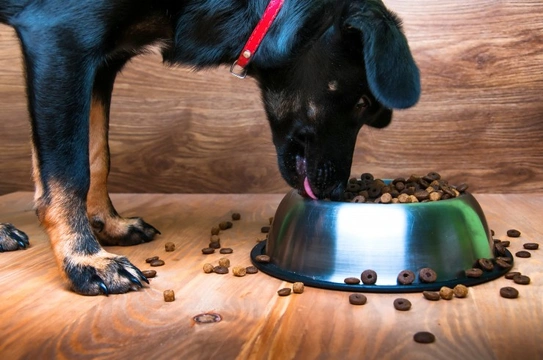
Five feeding tips to keep your young dog at a healthy weight for life
Obesity in dogs is as big an epidemic in the UK as it is for people, and many experts believe that there are actually more overweight dogs in the UK than there are dogs at a healthy weight – so much so that for certain breeds that often tend to be rounder than they should be like the Labrador retriever and the pug, seeing a lean dog that is at the ideal weight within these breeds is something of a novelty.
Many dog owners cannot even recognise when their own dogs are overweight unless they are already obese – which is not helped by the fact that many dogs of the same breed that the owner sees regularly are highly likely to be overweight too.
However, obesity and being overweight is a huge problem for dogs, and can lead to a wide range of different health problems over time, which can both significantly impact upon the dog’s quality of life, and also greatly shorten their lifespans.
Putting a dog on a diet is hard – dogs are very food oriented, and will not naturally moderate their food intake on their own. It is also hard for dog owners to deny their dog when they are hungry or acting as if they are hungry, which of course, further perpetuates the problem.
Starting off on the right food by feeding your dog appropriately when they are young – as well as training and managing your dog carefully to ensure that they do not get used to having lots of treats, or begging or scavenging – can help to ensure that your dog remains at a healthy weight for life, and does not begin to pile on the pounds as they get older.
Exercise is a vital and integral part of maintaining your dog’s weight too, of course – as is monitoring their weight and working quickly to correct fluctuations that may indicate that your dog is getting too lean, or too fat. However, good food habits and feeding your dog the right way are vitally important too.
In this article, we will share five feeding tips to help you to start as you mean to go on with your younger dog, to keep them at a healthy weight for life. Read on to learn more.
Measure your dog’s daily food allowance
Many dog owners simply scoop food into the dog’s bowl or pour food in until the quantity looks right – but if you weigh this food and compare it to the feeding guidelines for your dog’s breed and build, you may well find that you are feeding them too much.
Just a small additional number of unnecessary calories every day will soon cause your dog to gain weight, so always ensure that you measure out your dog’s daily food allowance carefully, and don’t simply fill their bowl and keep topping it up.
Count in the treats
Treats can be incorporated into your dog’s daily diet, but they should be fed in moderation and factored into your daily food measurement, rather than given as well as the quantity of proper food that your dog actually needs. If you give your dog low calorie treats they can have more of them, but for high calorie rewards, they will only be able to have a few each day – so when you measure out your dog’s main portions of food for the day, factor in the treats and cut down their portions accordingly.
Feed multiple small meals
Your dog should be fed at least two or preferably three meals per day, with their daily food portions divided up to give at the appropriate time. Feeding your dog just once a day will lead to them spending part of their day hungry and part of it overly full – which is not only not that nice for your dog, but also trains their body to hold on to weight and calories, and be very opportunistic about finding more food.
Giving your dog breakfast and dinner, and possibly lunch too will help to split their meals into portions that will keep them going all day long without getting too hungry.
Do not permit scavenging and begging
A dog that scavenges or begs is both poorly trained and bad mannered – and much more likely to be overweight! If you teach your younger dog from the get-go that begging and stealing or scavenging food is not permitted, they will not try to do this as they get older, and so, will not run the risk of eating foods that will interfere with their healthy diet, or that may be bad for them.
Don’t feed your dog human food and scraps
A dog’s diet needs to be designed for your dog, and not made up of or supplemented by human foods and table scraps.
Scraping the remnants of your dinner into the dog’s bowl is one of the fastest and most easily avoidable ways to cause your dog to gain weight – and cause problems later on when you need to restrict their food intake and return them to their healthy size.



